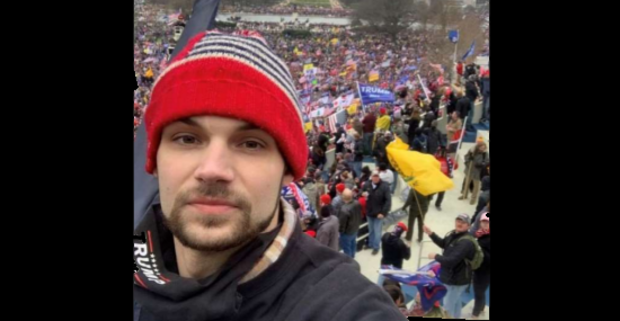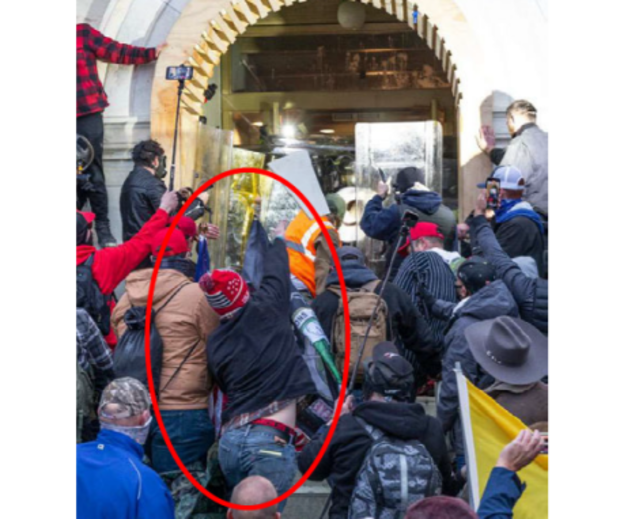QAnon follower Nicholas Languerand, who admitted he assaulted officers on January 6, sentenced to 44 months in prison
Washington – A South Carolina man who traveled to Washington, D.C., on January 6, 2021 and later assaulted officers outside the U.S. Capitol was sentenced to 44 months in jail on Wednesday.
Nicholas Languerand, an avowed follower of the QAnon conspiracy, pleaded guilty in November to assaulting officers and faced a maximum of 20-years prison sentence. However, prosecutors asked the court to sentence Languerand to 51 months.
This is one of the longest sentences handed down to a January 6 defendant yet. Robert Palmer, another man accused of assaulting an officer, received 63 months.
Languerand will get credit for the over nine months that he has served, and was ordered to pay restitution of $2,000 to the architect of the Capitol, who estimated that the attack caused about $1.5 million in damage to the Capitol building.
“The defendant engaged in, and pleaded guilty to, an extremely dangerous offense,” Judge John Bates said. “It strikes at the very heart of the democratic rule of law.”
Prosecutors alleged that Langueand had thrown “a variety” of dangerous objects at police, including an orange traffic barrier and stick-like objects he seemed to have obtained from the surrounding crowd attacking the Capitol.
And while he was at the Capitol, Langueran may have been armed, the government also wrote, citing social media activity in which the defendant said he was “carrying” in D.C. and in which he mentioned having a firearm at the Capitol. Notably, the government determined that his claim was unsubstantiated.
While Languerand admitted he had participated in the assault on the Capitol, investigators say he showed little remorse and even indicated that he wanted to see more violence, alleging he had sent a message to an associate that read, “Violence isn’t always the answer but in the face of tyranny violence may be the only answer,” and “Next time we come back with rifles.”
“I got some good shots in,” he also allegedly wrote about his attacks on police.
Languerand’s defense attorney William Welch, however, painted a more sympathetic picture of the defendant, asking Judge Bates to impose a sentence of a year plus one day in prison with credit for time served.
He was a child of addicts, Welch said, adding that his father had tried to kill his mother and that he was subjected to seemingly constant relocation during his school-age years. The defendant’s life was anything but easy, his lawyers explained, arguing his past that should be taken into account at sentencing,
Languerand’s grandmother, Susan Killion, also advocated for a lighter sentence due to the trauma inflicted on Languerand as a child. She said in court that after Languerand was laid off from his job prior to the Capitol riot, he became “isolated” from the rest of his family. Languerand’s grandfather Charles Killion also spoke at the sentencing in support of his grandson.
“Whatever difficulties the defendant faced as a child, it’s clear he overcame those difficulties, he got his high school diploma, he was accepted into the military, he functioned well before his [military] discharge, and he’s maintained employment,” Assistant U.S. Attorney Robert Juman said, anticipating the defense’s arguments, “A defendant’s difficult childhood does not explain his choice to engage in violence on January 6th.”
Investigators also found evidence of Languerand’s adherence to the QAnon conspiracy theory in his home, including a notebook that contained some references.
During Wednesday’s hearing, Languerand, who served in the Army, admitted he had been a QAnon acolyte but was misled by QAnon influencers, alluding to retired Lieutenant General Michael Flynn, an ally of former President Trump.
“Languerand’s cellphone also contained pictures of the leaders of the Proud Boys, 13 the logo of the militia organization the Three Percenters, 14 pictures of Nazi iconography, and several images of Languerand wearing a Guy Fawkes mask and holding weapons and notes about Washington D.C.,” investigators said.
In court on Wednesday, Bates said that Languerand’s letter to the court was a mixture of “excuses and remorse” and that the letter was “not the complete commitment, disavowal, and acceptance of personal responsibility that one might hope to see.” Bates added he did consider Languerand’s childhood experiences in his sentencing.
Download our Free App
For Breaking News & Analysis Download the Free CBS News app




